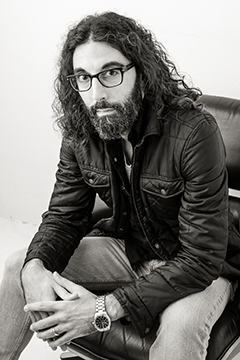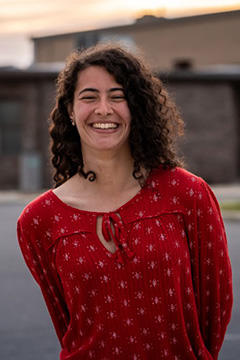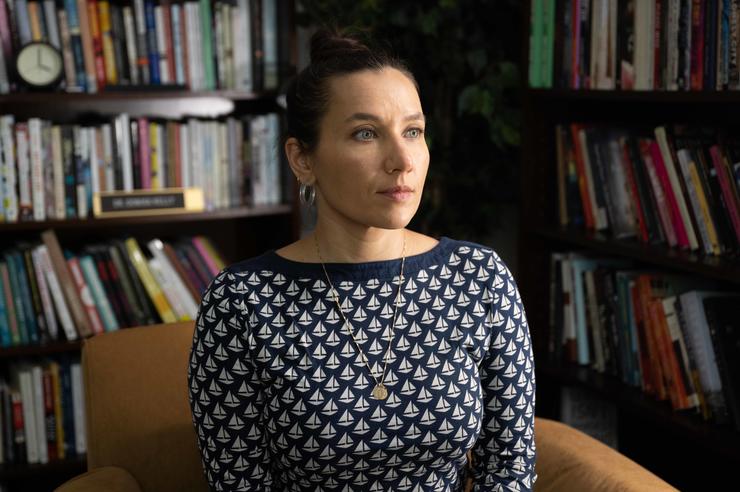Writing across disciplines: Among elite company

Carl Follmer tells University of Iowa students that in the professional realm, communication skills are the tiebreaker.
“Students applying for internships and jobs will be up against other students who have similar GPAs, who have also studied abroad and been involved in several student organizations. But a crucial differentiating factor that determines who gets the opportunity is often the communication ability of that student,” says Follmer, associate professor of instruction and director of the Frank Business Communication Center.
“Communication—of which writing is an essential element—is crucial. Getting your point across in an efficient and specific manner that’s convincing is essential. And we train students to do that.”
Employers consistently rank strong writing and communication skills high on their wish lists when hiring. Professionals in all fields need to be able to clearly and effectively convey important information, the impact of their work, and recommendations for how to proceed. This can be done through various mediums, including formal writing, presentations, public speaking, and social media.
Understanding the importance of such skills, U.S. News & World Report includes a ranking that recognizes the teaching of writing and communications across disciplines. The University of Iowa in 2024 ranked No. 9 and remained the only public institution on the list.
Iowa is known as the “Writing University” largely because of world-renowned graduate programs such as the Iowa Writers’ Workshop, but the university’s commitment to helping all students build strong writing and communication skills is evident in every corner of campus and every field of study.
Whether Iowa students want to write the next great American novel, a successful grant proposal, a research paper for a scientific journal, or a clear and informative business presentation, they have access to a vast array of writing and communication resources found at few other universities. These include the English and creative writing major, Certificate in Writing, specialized curriculum within campus departments, tutors, and multiple centers dedicated to writing and communication.
“There’s no one that can compete with us,” says Daniel Khalastchi, director of the Magid Center for Writing. “We are a big research university that values creativity and is located in a UNESCO City of Literature—one of only two cities in the entire United States honored with that distinction. Writing is literally embedded in our sidewalks, and no matter what our students want—whether it’s to be a journalist, a creative writer, or a strong business or science communicator—we are likely to have courses and programs on campus that support those interests or can easily create them because we have a talented pool of experienced writers living in our own backyard.”
Integrating writing and communication into all disciplines
The Writing Center works with Iowa students, faculty, and staff from departments and disciplines across campus. Established nearly 90 years ago, it was one of the first writing centers in the United States and has a longstanding tradition of writing instruction and support.
This central resource sees an astounding amount of traffic.
“Our professionally trained staff members work with approximately 2,000 students across some 8,000 appointments each year,” says Deirdre Egan, associate director of the Writing Center and academic programs manager in the Department of Rhetoric. “We provide direct, one-on-one writing instruction to all students, both from the College of Liberal Arts and Sciences and from other colleges that do not have a writing center of their own.”
The Writing Center buzzes with activity throughout the day as its graduate instructors welcome all kinds of writers, from first-year students learning the basics of academic writing to seniors with academic and creative capstone projects. Twenty percent of the clientele are graduate students working on theses, dissertations, and manuscripts for publication. Writing Center instructors offer feedback on structure, argument, organization, clarity, and effectiveness in lively conversations that take place both in person and in videoconference sessions.

“We want to offer every single student on campus, regardless of whether or not they are majoring in something that is directly related to writing, the chance to take advantage of the amazing opportunities at the University of Iowa.”
In addition to working with writers, a core mission of the Writing Center is to ensure that the UI’s expertise in writing reaches every student studying at Iowa by supporting its faculty. Through workshops on teaching with writing, an interdisciplinary faculty Obermann Working Group, and an undergraduate Writing Fellows peer mentoring program, their goal is to encourage all Iowa faculty and instructors to include writing and writing instruction in their courses.
“We have longstanding ongoing collaborations with other writing centers on campus and an active research program,” Egan says. “We’re excited about the focus on writing and communication in the university’s recently announced Distinctive Collaborative Opportunities initiative and we look forward to participating in plans to build and invest in this area.”
The Magid Center, located in the College of Liberal Arts and Sciences Engagement Hub, offers students across campus the opportunity to enhance their academic, creative, and professional communication skills by focusing on the written word. In addition to sponsoring the Certificate in Writing, the center also publishes 10 student publications and is home to the Iowa Youth Writing Project, Iowa Young Writers’ Studio, and Iowa Summer Writing Festival.
“We want to offer every single student on campus, regardless of whether or not they are majoring in something that is directly related to writing, the chance to take advantage of the amazing opportunities at the University of Iowa,” Khalastchi says.
More than 500 students have earned a writing certificate since 2012. There were 44 distinct majors represented among the students enrolled in the writing certificate program in May 2024, from political science to psychology, computer science, neuroscience, and everything in between.
“We want to work with students who have a love for writing but are majoring in something that is not writing-centered, as well as students who simply know that being a strong written communicator is going to help them be more successful when they enter the job market or apply to graduate school,” Khalastchi says. “We are a space where students can find a balance of academic rigor and professional resources and walk out of here writing and communicating better than ever before.”
Aurora Navarro Cancel chose to go to Iowa largely for its School of Music. But the Ankeny, Iowa, native also loved to write and wanted a chance to pursue that passion in some form during college. She graduated in May 2023 with a Bachelor of Music in music therapy, a minor in French, and a certificate in writing.
“One thing I appreciated about the writing certificate was that it required pretty few credits, which allowed room for all my other classes for my major and minor,” Navarro Cancel says. “I also liked how flexible it was. There wasn’t a rigid path of which classes you had to take.”
While Navarro Cancel says the writing certificate will help in her chosen career—music therapists engage in a fair bit of songwriting—it also played a role in her life beyond the academic world.
“I love writing, and it was nice that amid the busyness of school, where l lost a lot of motivation to write, that I had that structure that forced me to write. It provided me a creative outlet,” Navarro Cancel says. “If not for that, I probably would not have written anything during college, which would have been sad.”

“I love writing, and it was nice that amid the busyness of school, where l lost a lot of motivation to write, that I had that structure that forced me to write. It provided me a creative outlet.”
The Magid Center also works with departments across campus to develop writing courses for specific majors. In the past, they have worked with the Department of Health and Human Physiology to create the highly successful Writing for Health and Human Physiology, and the center is currently working closely with the College of Nursing to implement and support writing courses for its students.
“We’re trying to remind people that while you might not love writing, if you can do it successfully, you’re going to be better off,” Khalastchi says. “And I think students are starting to recognize that and get excited about what Iowa has to offer.”
Writing, communication skills give Iowa students a leg up in the business world
The importance of strong communication skills is built into the culture of the Tippie College of Business. In fact, its Frank Business Communication Center was the first business communication center in the Big Ten.
“You can have the best ideas in the world, but you need to be able to communicate them effectively,” Follmer says. “And Tippie students get a terrific education in technical content and communication skills.”
The Frank Business Communication Center helps students hone their communication skills through tutoring and business communication courses, and works with faculty to develop writing, presentation, and data visualization assignments in more than 40 classes across majors and programs within the college.
While grammar and sentence structure are always important, Follmer says the center emphasizes macro communication skills, such as organization of message and audience analysis. It also works with advisory boards and employers to gain insight into what skills they are seeking in new hires.
Thanks to recent feedback, Follmer says the center is working to place extra emphasis in areas such as professional email writing, visual communication such as PowerPoint slide design, and effectively utilizing artificial intelligence.
“We’ll be teaching students how to use AI to create business messages and increase their efficiency,” Follmer says. “They will need to be able to read critically and pair that with audience analysis to adapt a message for a specific audience.”
Employers were asked to rate the importance of career-readiness competencies. Communication ranked the highest.
The competencies, with their weighted average rating on a five-point scale:
- Communication (4.55)
- Teamwork (4.49)
- Critical thinking (4.48)
- Professionalism (4.25)
- Technology (3.98)
- Career and self-development (3.83)
- Leadership (3.60)
Source: National Association of Colleges and Employers (NACE) Job Outlook 2024
Isabelle Wilcox understands the importance of strong writing and communication skills in the business world.
“You can be great at learning statistics and doing analysis, but all of that is essentially worthless if you can’t communicate your findings and what those statistics and analysis mean,” Wilcox says. “Companies know that, and they’re looking for people who not only have harder skills, but more importantly have those softer communication skills. It’s way harder to teach how to write a memo or make an effective PowerPoint than to teach skills like coding or running analysis.”
Wilcox, who graduated in May 2023 with a BBA in economics and BA in art history, says she always thought of herself more as a math person, but she always enjoyed writing. She became a communications consultant at the Frank Center during her third year.
She says she appreciates how much the University of Iowa values writing—in all fields.
“Every single business class has some form of presentation or writing report, and that’s on purpose because Iowa emphasizes writing and communication,” Wilcox says. “There are writing resources literally everywhere you go on campus. Having to learn about different modes of communication, whether in the humanities or in business, makes you a well-rounded student. And having writing tutors and help available everywhere helps you hone those skills.”
Follmer says the university’s rich writing tradition provides an immense talent pool to draw upon when hiring tutors, consultants, and graders.
“One unique thing about our model at the Frank Center is that all of our professional writing and communication consultants are associated with a writing aspect of the university in some way, whether it’s technical writing or creative writing,” Follmer says. “We draw from a lot of these different sources and help them understand how business communication works and how their skill sets fit in and can strengthen our students’ abilities.”

“Every single business class has some form of presentation or writing report, and that’s on purpose because Iowa emphasizes writing and communication. There are writing resources literally everywhere you go on campus.”
Strengthening future engineers’ communication skills
Like the Tippie College of Business, the Iowa College of Engineering recognizes that engineers with strong writing and communication skills stand out from their peers. The endowed Hanson Center for Communication provides students resources to help write, revise, and clarify lab reports and essays, as well as space to practice presentations and receive feedback.
“Engineering is coming up with new ideas, problem solving, and thinking, ‘How can we make this better?’” says Hannah Vogts, a fourth-year biomedical engineering student from North Liberty, Iowa. “But if you have an idea and you can’t clearly and effectively communicate it, you’re not going to get anywhere.”
Vogts discovered the Hanson Center her first year at Iowa when an assignment required students to visit it. She is now in her fourth year as a tutor in the center.
“I think there’s a stereotype about engineers, that they can’t talk to people and aren’t good communicators,” Vogts says. “Having a writing center in the engineering college gives us a leg up when we graduate because we can write and communicate clearly and effectively.”
Vogts encourages her fellow engineering students to take advantage of all the writing resources available to them.
“To practice communication as a whole and not just technical communication is really beneficial,” Vogts says.
Developing better doctors through writing
Iowa’s appreciation of and commitment to writing and communication also is evident in the Roy J. and Lucille A. Carver College of Medicine. The college’s Writing and Humanities Program gives medical students the space and time to pursue interests in the arts and humanities, as well as develop skills critical for their futures as successful physicians.
Camille Socarras, director of the Writing and Humanities Program, says the skills medical students gain through the program will help them in all aspects of their lives.
“Integrating writing, humanities, and the arts into medical education enriches students’ professional skills, enhances patient care, and supports their own well-being, ultimately contributing to a more balanced and effective medical practice,” Socarras says.
The Writing and Humanities Program offers elective courses such as writing and medicine, literature and medicine, and editorial writing for medical students. It also provides consultations to review CVs, research papers, patient notes, presentations, creative writing, and any other form of writing.
Socarras says effective communication with patients is a skill that med students are expected to develop but isn’t always addressed in a formal medical school curriculum.
“Humanities and the arts foster a deeper understanding of the human experience and enhance empathy, which is crucial for building trust and rapport with patients, understanding their perspectives, and delivering compassionate care,” Socarras says.
In addition to curricular elements, the Writing and Humanities Program produces The Examined Life Journal, a publication of the Carver College of Medicine; The Short Coat Podcast; and hosts the annual Examined Life Conference.
Socarras says she hopes that the Writing and Humanities Program will continue to help bridge the gap between the science of medicine and the human experience of illness, helping create a more empathetic and effective healthcare system.
“Learning to analyze situations from multiple disciplines and perspectives is beneficial in patient care, while critical thinking about the moral and ethical dimensions of medical practice encourages students and practitioners to reflect on their own values, biases, and the impact of their work,” Socarras says.
Developing lawyers’ superpower
“Words are a lawyer’s superpower,” Dawn Barker Anderson says. “Good writing requires good thinking. So, if you can express your words and your ideas clearly, it means you’re thinking clearly. Legal employers are always looking for students who can communicate well, be that in writing or orally.”
Anderson is a professor of legal analysis, writing, and research at the University of Iowa College of Law. The College of Law has seven dedicated legal-writing faculty with more than a century of combined teaching experience.
“Some of the highest-ranked law schools don’t have any dedicated writing faculty,” Anderson says. “We hear from judges about how strong our students are in writing and how favorably they compare to students from other highly ranked law schools. We work closely with students throughout their program of legal study to hone their writing skills.”
In addition to the classroom writing experience, students are supported by the Writing and Academic Success Center. The center, directed by Anderson, was the first writing center of any kind to be housed exclusively within a law school. The center serves as an extension of the first-year Legal Analysis, Writing, and Research classroom, and peer tutors meet with first- through third-year students on course assignments, journal articles, and writing samples, providing feedback on organization, clarity, style, citation, and grammar.
Anderson says students practice their writing skills in the classroom, in their internships, by participating in national writing and advocacy competitions, and by writing for any one of four student-run law journals. In fact, Iowa Law has advanced to the National Final Rounds of the New York City Bar Association’s National Moot Court Competition for four consecutive years. During this period, its teams have earned numerous brief-writing awards, including winning the nation’s top-scoring Respondent’s brief in 2024. Iowa Law is also the only school in the country with multiple first-place finishers in the Sports Lawyers Association annual law-student writing competition. Meanwhile, the college’s Journal of Corporate Law is ranked second among corporate law journals, and a study by Washington & Lee University ranks the Iowa Law Review as the ninth most popular journal for overall citations and the third most popular journal for case citations over the past seven years.

“We hear from judges about how strong our students are in writing and how favorably they compare to students from other highly ranked law schools. We have really honed that skill.”
“There are so many opportunities for students to hone their writing skills while pursuing their unique passions and interests,” Anderson says. “Iowa has a good reputation for producing really good legal writers, and many students say that the writing program influenced their decision about where to go to law school.”
Making writing a career
For those undergraduates who want to make writing a centerpiece of their professional lives, the university continues to expand on its long and historic creative writing tradition.
The English and creative writing major combines a rigorous grounding in literary study with a workshop-style focus on writing. Started just eight years ago, the major’s popularity grew quickly. In spring 2023, the program housed 657 students and was one of the top majors of undergraduate degree applicants.
“Michelangelo looked out of his window and saw marble quarries, and so he sculpted the David. When our students put their ear to the soil, what they hear and what they see when they look out their windows, is a raw overwhelm of language,” says Kaveh Akbar, associate professor and director of the English and creative writing major. “The material of our age and our station is language. And to be adept with that material, to use it with rigor and fluency, is a noble pursuit.”
The major is designed to give students the tools to follow a variety of career paths, including creative writing, publishing, editing, public relations, marketing, advertising, social media communications, and teaching.
“Not every student that graduates from our program is going to go out and be New York Times bestsellers—although many have been,” Akbar says. “We’re imagining forward to futures that allow these students to take what they’ve learned and apply it to fields across the board, from business, to politics, to social work, and science. In 2023, I can’t imagine a more universally applicable skill set.”
This skill set also includes AI. Akbar says he, his colleagues, and his students are imagining ways to use the technology creatively. But he says he is not worried about AI ruining literature.
“AI is very good at producing the exact average output, but history-making literature has never been about average,” Akbar says. “Truly exceptional writing will still be as undeniable as ever.
“But I do think that there is space to learn skills like prompt engineering. How can you deliver a prompt to an AI system so that it gives you something interesting or provocative that you can then sort of riff around? These sorts of skills are totally applicable and useful—and, I think, exciting.”
The demand for content also is increasing within the television and film industry. To help foster the next wave of such storytellers, the university debuted an undergraduate screenwriting degree program in 2019. In fall 2024, 195 students were enrolled in the program.
Iowa has long been a destination for its graduate writing programs, and its undergraduates are able to reap the benefits.
“I think that Iowa City has the greatest density of literary talent of any city in America,” Akbar says. “The idea that you can come across Donika Kelly or John D’Agata or Sam Chang or Jamel Brinkley on the street is insane. It’s the sort of thing that you would expect from a city 50 times our size—but in that case, you would never get to actually know them.”
The writing and communication skills that all students gain at Iowa will benefit them long after they leave campus—both professionally and personally.
“Literature breeds empathy,” Khalastchi says. “It helps give an understanding to the world around you, and these are things everyone can take into their field, no matter what profession they choose. Literature and writing are taken seriously here, whether you want to be a bestseller or successful grant writer. You put those together and it’s the most unique writing environment in the world.”



